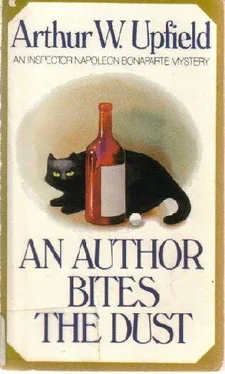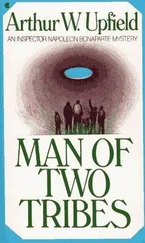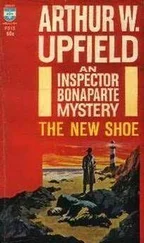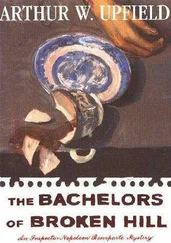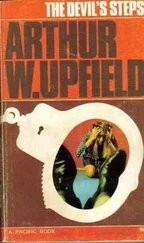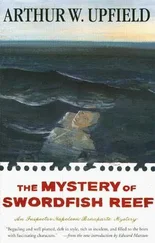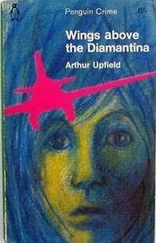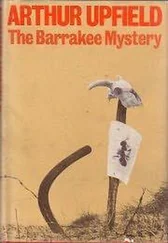Arthur Upfield - An Author Bites the Dust
Здесь есть возможность читать онлайн «Arthur Upfield - An Author Bites the Dust» весь текст электронной книги совершенно бесплатно (целиком полную версию без сокращений). В некоторых случаях можно слушать аудио, скачать через торрент в формате fb2 и присутствует краткое содержание. Жанр: Классический детектив, на английском языке. Описание произведения, (предисловие) а так же отзывы посетителей доступны на портале библиотеки ЛибКат.
- Название:An Author Bites the Dust
- Автор:
- Жанр:
- Год:неизвестен
- ISBN:нет данных
- Рейтинг книги:5 / 5. Голосов: 1
-
Избранное:Добавить в избранное
- Отзывы:
-
Ваша оценка:
- 100
- 1
- 2
- 3
- 4
- 5
An Author Bites the Dust: краткое содержание, описание и аннотация
Предлагаем к чтению аннотацию, описание, краткое содержание или предисловие (зависит от того, что написал сам автор книги «An Author Bites the Dust»). Если вы не нашли необходимую информацию о книге — напишите в комментариях, мы постараемся отыскать её.
An Author Bites the Dust — читать онлайн бесплатно полную книгу (весь текст) целиком
Ниже представлен текст книги, разбитый по страницам. Система сохранения места последней прочитанной страницы, позволяет с удобством читать онлайн бесплатно книгу «An Author Bites the Dust», без необходимости каждый раз заново искать на чём Вы остановились. Поставьте закладку, и сможете в любой момент перейти на страницу, на которой закончили чтение.
Интервал:
Закладка:
Bony could have counted slowly up to six before Mrs Blake spoke.
“The plot of your novel is certainly original, Mr Bonaparte,” she said thoughtfully. “You know, I-I rather like it. I do hope it is successful. You have studied the natives of your country?”
It was less a question than a statement, and Bony hoped that she knew little, if anything, about the natives of South Africa.
“I have always been interested in them,” he said, “chiefly, I think, for their diversity of customs and their wide range of intellectual powers.”
“You have delved a little into voodooism and that kind of thing?”
“I have merely skated over the surface,” Bony replied, adding with a smile, “The more one skates the more one is conscious of the deeps below.”
“Yes, that is so, Mr Bonaparte. Have you met Professor Armberg?”
Luck favoured Bony, for only recently had he read an anthropological work by Professor Armberg.
“Unfortunately, I have never met the professor,” he said. “I have, of course, heard a great deal about him, and my paper has published a number of his articles.”
“A learned man, Mr Bonaparte, and a charming correspondent. We have been writing to each other for some considerable time. He can have no equal in knowledge of the savage superstitions and of the practice of black magic. Are you staying long in Australia?”
“No. My return passage is timed for the end of February. By then I hope to have gathered sufficient material for a travel book about Australia. It can, of course, be only superficial. I have in mind a section devoted to the growth and status of Australian literature, and thus it was that during my conversation with Miss Chesterfield she said I must meet you. I am indebted to Miss Chesterfield.”
Mrs Blake caught the gleam in his eyes and smiled.
“Nancy Chesterfield wrote that you are staying in Yarrabo.”
“For a few days, yes,” he said, a trifle relieved that he could speak the truth-partially. “My brother was Mrs Faro’s husband, who changed his name by deed poll, and when I came to see her, I was so struck by the beauty of the locality I decided to stay for a week at least. She couldn’t put me up, and so she persuaded Miss Pinkney to take me in. A charming lady.”
The dark eyes momentarily hardened. Then, “As you say, Mr Bonaparte, Miss Pinkney is a charming woman. She is, however, a little inclined to gossip, and you will know what that means in a small place like Yarrabo.”
“I do suspect her, just a little,” Bony admitted, lightly. “I’ve had, now and then, to be a little cautious.”
Mrs Blake smiled for the first time with frankness.
“Wise man,” she said. “Well, now that we have met, I’d like you to meet a friend who has come from the city to see me. Would you care for a cup of tea?”
“I do not remember ever declining the offer of a cup of tea, Mrs Blake.”
“Then come along,” Mrs Blake urged him, rising. “We’ll go to my writing-room.”
Bony was conducted along a passage to a room that widened his eyes. It was a spacious room dominated by pale yellow and white and gleaming walnut. He received the impression of many eyes watching him, and of one pair of eyes, dark and sombre, set in the tragic face of a tall woman standing with her back to a service trolley.
“Ella, this gentleman is a novelist and journalist from South Africa. Nancy persuaded him to call. Meet Mr Napoleon Bonaparte. My friend, Mrs Ella Montrose, Mr Bonaparte.”
For the second time within the hour, Bony bowed low.
“Mrs Montrose is an established novelist, Mr Bonaparte, and so you two should have much in common,” Mrs Blake proceeded. “Poor me, I am merely a short-story writer.”
Only in colouring was Ella Montrose akin to Mrs Blake. Her eyes were softer and set in a pale and slightly over-long face. She had the figure of a young woman, though her age was probably verging on fifty. Her clothes were expensive, but a little bizarre. Her voice when she spoke was low and rich in tone.
“Welcome to Australia, Mr Bonaparte,” she murmured. “I am not going to be so silly as to ask what you think of Australia, but I do hope you like the country and will like us.”
Bony was induced to sit down and Mrs Blake served tea, at the same time telling Mrs Montrose what the visitor had related about his novelI Walk On My Toes. Mrs Montrose evinced keen interest, and her interest was not assuaged until she had gained the answers to several questions. He talked easily of cabbages and kings against the background of literature, mentioned the titles of Ella Montrose’s two novels which, regretfully, he admitted he had not read, and was cautious in his praise of the work of the late Mervyn Blake and Mr Wilcannia-Smythe. After his interview with Nancy Chesterfield, he dared not mention I. R. Watts.
He hoped he was acquitting himself well, because his mind was unsettled by the framed portraits that covered the whole of one wall of this luxurious room.
Mrs Blake evidently noted this distraction, for she said, “I see you are interested in my friends, Mr Bonaparte. Let me introduce them to you.”
They rose, and she led him to the end of the gallery nearest the door. Ella Montrose wheeled the trolley out of the room, closing the door after her, and Mrs Blake continued talking, more vivacious in manner and warmer in voice.
The pictures were not of the same size, but the frames were uniform in size and of the same wood. They were spaced along three rows, and there must have been more than forty.
“I am, Mr Bonaparte, more liberal in my views than was my late husband and Mrs Montrose,” Mrs Blake told him. “That man, for instance, had published nine novels and two volumes of verse when he died a few years ago. His name wasEdwardes. He wrote very well, but just failed to make the grade. Actually, he wrote better novels than Mr Wilcannia-Smythe is doing, but it is said of Mr Wilcannia-Smythe that his prose is exquisite in balance and rhythm. The next portrait is of Mrs Ella Montrose. Her work is much appreciated by the discerning, and we are still expecting her to produce the Great Australian Novel.”
Bony was introduced to ProfessorZadee and MrXavior Pond as “powerful friends of Australian literature”. Mrs Blake discoursed on several others, men and women who were revealing “great promise”. Then he was looking at a picture of the late Mervyn Blake, whom he recognized from the pictures of the man contained in the official file.
There was something about this picture that disturbed him. Mrs Blake spoke of her husband’s novels and literary work in general. “He was the acknowledged premier critic in Australia,” she told him, and still the picture disturbed him. For one thing it appeared to be in the wrong position in this gallery, and the thought occurred that Blake should have the place beside Wilcannia-Smythe and Mrs Montrose.
Then he was being introduced to Dr Dario Chaparral, and the Blake picture passed from his mind.
“Dr Chaparral visited this country early last year,” Mrs Blake said. “He stayed with us for a little while. A charming man, he spoke English fluently-which was fortunate for us, as he is a Colombian.”
“I have read his book, The Literature of the Western Pacific Peoples,” Bony confessed, for the first time feeling himself on firm ground. “I thought it a very sound piece of work. Miss Chesterfield commended it to me.”
“Indeed! Yes, Dr Chaparral’s study was well done, although perhaps he might have been a little less conservative in his final judgments. He could well have been more generousto little Twyford Arundal here. If it were not for a slight weakness, I could confidently predict that Twyford Arundal will become Australia’s greatest poet of all time.
Читать дальшеИнтервал:
Закладка:
Похожие книги на «An Author Bites the Dust»
Представляем Вашему вниманию похожие книги на «An Author Bites the Dust» списком для выбора. Мы отобрали схожую по названию и смыслу литературу в надежде предоставить читателям больше вариантов отыскать новые, интересные, ещё непрочитанные произведения.
Обсуждение, отзывы о книге «An Author Bites the Dust» и просто собственные мнения читателей. Оставьте ваши комментарии, напишите, что Вы думаете о произведении, его смысле или главных героях. Укажите что конкретно понравилось, а что нет, и почему Вы так считаете.
